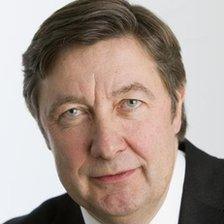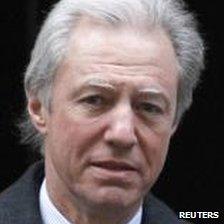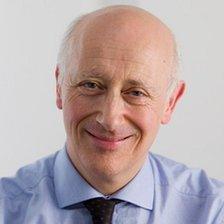BBC pay-off row: Who said what
- Published
Current and former senior BBC managers and members of the BBC Trust have been questioned about executive pay-offs by the House of Commons Public Accounts Committee (PAC).
Two recent reports have found that the corporation paid outgoing senior managers £2.9m more than was contractually necessary in severance payments between 2006-12.
Mark Thompson, former director general
Mark Thompson: "Mark Byford's pay-off was value for money"
Mr Thompson ran the BBC between 2004-12. In the three years up to the end of 2012, £25m was paid in severance payments to senior executives, according to a scathing National Audit Office report published in July.
The largest payment went to Mr Thompson's deputy Mark Byford, who received £949,000 in 2011. Mr Thompson said the pay-offs were necessary to reduce the number of senior managers, which would save money over time.
But a bitter row erupted between Mr Thompson and the BBC Trust over whether the trust knew about and authorised the overpayments.
At the hearing on Monday, he said the BBC Trust put him under "ferocious pressure" to cut senior staff numbers in order to reduce costs.
He said he stood by his claim that the trust had misled the PAC over the events in the past. He denied that he had kept the trust in the dark about severance packages, saying it had been "fully informed" of what was going on.
He also denied that the payment to Mr Byford was more than he was contractually entitled to, explaining he had been "advised it was contractual".
Mr Thompson became chief executive of the New York Times in November.
Chris Patten, BBC Trust chairman
Lord Patten tells the committee that he "cannot accept" that he misled them over payments
Lord Patten, a former Conservative minister and governor of Hong Kong, became chairman of the BBC Trust in 2011.
The trust, which replaced the BBC governors in 2004, is supposed to oversee the corporation on behalf of licence fee payers.
At a Public Accounts Committee hearing in July, Lord Patten told MPs he had been "shocked and dismayed" to learn of the overpayments after they had been made.
At the follow-up hearing on Monday, he insisted that he could not have known about the pay-offs because the most significant decisions were taken before he joined.
"I'm accused of having misled the committee on something that I never knew and couldn't have been expected to know," he said.
He said a briefing he was given before the publication of the BBC annual report for 2010/11 said pay-offs to Mr Byford and former marketing boss Sharon Baylay, who left with £390,000, were "contractual payments".
The pay-off row follows heavy criticism of Lord Patten's handling of the Jimmy Savile scandal. In July, he said he would stand down from the trust when his four-year term ended in 2015.
The latest controversy has put the future of the trust in the spotlight, with some reports suggesting it will be scrapped and regulation of the BBC handed to media watchdog Ofcom.
Anthony Fry, BBC Trust member

Anthony Fry is the head of the BBC Trust's finance committee. He steps down from his role this autumn after becoming the Premier League's new chairman.
At the PAC hearing in July, Mr Fry said of the pay-offs: "We were assured that they were within contractual terms. We were told that they had been signed off in the proper fashion by the remuneration committee of the BBC executive board."
In the September follow-up, Mr Fry told the PAC there had been "months and months of arguments" between the trust and the BBC management over financial issues such as pay, perks and bonuses - although he admitted that severance packages were not given much attention.
"It became a battleground. I got the distinct view... that our views were not being taken with what I believed was the seriousness they deserved," he said.
Lucy Adams, BBC HR director
The BBC's head of HR has said she made a mistake in her evidence to MPs over 25m paid to departing BBC executives.
Ms Adams, outgoing director of human resources, is responsible for overseeing all recruitment, training and development as well as remuneration and benefits.
In July, she claimed Mr Byford's payout was in line with "custom and practice" at the time. She added that the "overwhelming focus was to get numbers out of the door as quickly as possible".
At the time, she said she did not know of a key letter from BBC management to the BBC Trust saying the pay-offs were in line with the contractual terms.
But last week she said she had made a mistake in her evidence to MPs, admitting that she helped compose the letter but did not recognise it from its description during the July hearing. She apologised during the 9 September session.
Ms Adams, who is paid £320,000 a year, recently announced she would leave the corporation in March 2014 after five years, without any severance pay.
Sir Michael Lyons
Sir Michael Lyons: "It was not easy to make reductions in senior management"
Sir Michael Lyons was chairman of the BBC Trust between 2007-11.
The payment to Mark Byford took place during his tenure. He said the trust had been "damaged" by the controversy, adding that the pay-off process could have been handled more "cleverly".
However, he said he did not think the process of cutting the number of senior managers at the BBC could have been done more cheaply. "I am not personally convinced that's the case," he said. "My judgment tends towards that of the director general here."
On the question of who signed off the payments, he said he had discussions with Mr Thompson about Mr Byford's exit but insisted there was "nothing at all that could constitute approval by me".
Responding to Mr Thompson's assertion that he "disclosed completely" the terms of the payments for Mr Byford and Ms Baylay to the trust, Sir Michael replied: "Mark Thompson clearly does believe that he conveyed to me that the severance terms for Mark Byford would 'double dip' - that he would work some time but he would be paid in lieu of notice.
"I don't think I was given that information... I don't think that is possible."
Marcus Agius

Marcus Agius became senior independent director on the BBC executive board in 2006.
He was chairman of the BBC executive board remuneration committee, which was responsible for approving significant pay-offs.
He told the committee there had been "a great deal of concern" within his committee "about these redundancies and the amounts".
"We challenged and tested Mark Thompson and after sustained debate we were finally persuaded on value for money grounds," he said.
He said it had been worth paying Mr Byford extra to ensure his presence during a period of internal turmoil. "We were absolutely conscious of the need to manage the BBC during a period of considerable upheaval and turmoil and to keep Mark Byford doing the job he needed to do."
Mr Agius left his role at the BBC when his term expired last year. He was also chairman of Barclays until 2012, when he resigned in the wake of the Libor inter-bank lending rate scandal after more than five years in that role.
Nicholas Kroll, director of BBC Trust

Nicholas Kroll runs the BBC Trust Unit, which supports the BBC Trust with independent advice and administrative support.
Mr Kroll said the trust had "specific responsibility" for payments to the director general only - not other members of the executive board.
Mr Kroll was involved in some tetchy exchanges with Mr Thompson, accusing him of not disclosing the details of Mr Byford's package to the trust.
He also said Mr Thompson expected the Trust Unit to do "some sort of jigsaw analysis of various pieces of paper in order to work out what he means".
Before joining the BBC Trust, Mr Kroll worked as a senior civil servant in the Department for Culture, Media and Sport, where he helped establish the BBC Trust in 2004, as well as the Treasury and the Department for Transport.
- Published9 September 2013
- Published6 September 2013
- Published6 September 2013
- Published6 September 2013
- Published1 July 2013